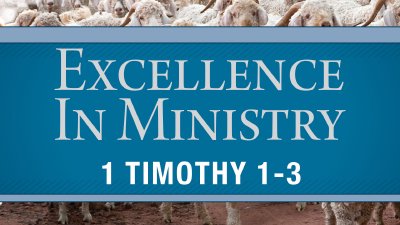


Excellence in Ministry: Starting Strong
10 Sermons on 1 Timothy 1–3
The Church as God Planned It
Pastor Chuck Swindoll
Shortly before his death, Paul wrote three letters on the subject of the local church—specifically on pastoral responsibilities within the church. These letters are 1 Timothy (written in AD 63), Titus (AD 63), and 2 Timothy (AD 67). The Pastoral Epistles, as they are commonly called, provide believers with the earliest and most reliable guidelines for the local church. They dictate the way issues in the church should be handled, the philosophy that should be embraced within the church, and the manner in which the church should be led. Over the centuries, human tradition has often outshouted biblical principles and caused the church to get off course, which has resulted in every conceivable extreme in teaching and in doctrine, including heresy. In this expositional study of 1 Timothy, we return to the source—the Bible—and discover afresh how God planned the church to function.
What's a Pastor to Do?
Pastor Chuck Swindoll
First Timothy, the flagship of Paul's “pastoral” letters, defines the role of the pastor and the function of the church. Our goal is to learn from this first-century epistle about some of the concerns and pitfalls of ministry and apply God's instructions to the twenty-first-century church. This study offers insight on the theology of ministry based on biblical guidelines—as opposed to human experience, opinion, prejudice, culture, or personal preference. Let's keep a keen eye on what is written in God's Word and then do our best to let it shape our thinking.
Undeserved Mercy for an Unbelieving Rabbi
Pastor Chuck Swindoll • 1 Timothy 1:12–17
One of the benefits of studying a New Testament letter is the opportunity to become better acquainted with the writer himself—in this case, Paul the apostle. In this brief vignette (a mere six verses), we don't read of Paul's role and ministry as an apostle—strong in faith and unswerving in dedication. Rather, we read of Paul—called Saul—before his conversion to Christ. Saul was “a blasphemer and a persecutor and a violent aggressor” who, by his own admission, “acted ignorantly in unbelief ” (1 Timothy 1:13). Ironically, Saul was a religious zealot, an intense rabbi, sincere to the core . . . but sincerely wrong. And so? Mercy came to the rescue!
What's FIRST in a Meaningful Ministry?
Pastor Chuck Swindoll
A successful industrialist once addressed a large body of executives. Speaking on the topic “Following the Leader,” he revealed two difficulties most leaders face. First, leaders struggle with getting people to think—to really think. Second, leaders struggle with getting people to establish and maintain priorities. This lesson focuses on the second challenge—establishing and maintaining priorities for a meaningful ministry. What's true in business is true in the church and in the home. We all wrestle with doing things in order of importance. One of the reasons for this struggle is that we often don't know what deserves our immediate attention. For ministry, our first priority is clear: prayer.
God's Desire, Man's Debt, Christ's Payment
Pastor Chuck Swindoll • 1 Timothy 2:3–7
It's easy to forget foundational truths. We are so familiar with them, we tend to take them for granted. This is especially true of salvation. Some of us have walked with Christ for so long the joy of our salvation wanes more than it waxes. It's not that we're ungrateful; it's just that we're forgetful. In the work-a-day world of daily life, it's simple to overlook the significance of the gospel. Paul, of course, never did, and in this section of 1 Timothy—one of the most practical and clearest presentations of the gospel in the New Testament—he challenges us to open our eyes and our hearts, once again, to its wonder.
What about Women in the Church?
Pastor Chuck Swindoll • 1 Timothy 2:9–15
The role of women in the church is a hot issue, best handled with sensitivity and compassion—and maybe a pair of asbestos gloves! This is not because Scripture is controversial but because the role of women in the culture is different from what Scripture teaches about the role of women in the church. So, questions rise like steam from a boiling kettle. What positions should women hold within the church? Can they serve as elders and be ordained to preach? Can women pray in mixed company? Or should they remain quiet altogether? Some say women can serve in the highest office of church leadership. Others muzzle women, treating them as second-class citizens. What does the Bible say?
Checklist for Choosing Church Leaders
Pastor Chuck Swindoll • 1 Timothy 3:1–7
God doesn't always spell out things in stark, “thou shalt” terms. He did in the Ten Commandments (Exodus 20:1-17; Deuteronomy 5:6-21), but most of God's Word is filled with stories, prophecies, proverbs, psalms, and biographies. When we get to the epistle of 1 Timothy, however, we discover virtually a whole chapter devoted to a black-and-white list requiring little interpretation but a lot of application. In 1 Timothy 3:1-7, Paul put his finger on the essential qualities God looks for in overseers—qualities as applicable for church leaders in the twenty-first century as they were in the first century. We'll look at the first two verses in this lesson and the last five in the next message.
Another Look at the Checklist
Pastor Chuck Swindoll • 1 Timothy 3:3–7
You can't escape it: a Christian's conduct matters . . . greatly. Christ's reputation is on the line, and nonbelievers are watching. This makes God's “gamble” seem crazy—that sinful, Spirit-filled people are called to lead His church. Is it any wonder then that He decrees that His leaders be above reproach? Not at all. In lesson 7 we looked at the first two verses of 1 Timothy 3 and seven character qualities every overseer must demonstrate. In this lesson, we'll explore verses 3-7 and seven more character traits. Under the inspiration of the Holy Spirit, Paul continued to set forth in plain, uncomplicated language the non-adjustable, non-alterable essentials of God's standard for church leadership.
The Dignity of Servanthood
Pastor Chuck Swindoll • 1 Timothy 3:8–13
You can't put a price on a good name. An honored and respected reputation is worth more than “silver and gold” (Proverbs 22:1). In fact, we could write in bold letters this very proverb across the last couple of lessons of this sermon series—the ones dealing with the necessary qualities for the office of overseer (1 Timothy 3:1-7). We could do the same in this lesson, too, because a sterling reputation for those who serve as deacons in God's church is just as essential (3:8-13).
A Hope, a House, a Hymn
Pastor Chuck Swindoll • 1 Timothy 3:14–16
We could consider 1 Timothy the handbook on biblical ministry within the church. The first half focuses on the work of ministry—the service. The second half focuses on the workman who performs ministry—the servant. The interlude between these two halves (1 Timothy 3:14-16) focuses on the why of ministry—the soul. Without soul the service the servant performs is sterile. The ministry may be theologically and biblically correct, but it's all head and no heart. Fortunately, as we'll see in this message, Paul's was anything but a heartless or soulless ministry.


